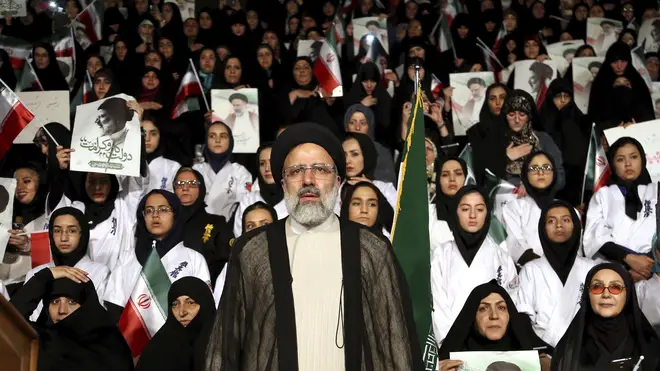
Shelagh Fogarty 1pm - 4pm
15 May 2021, 09:24

Ebrahim Raisi took part in a panel involved in the mass execution of thousands of prisoners in 1988.
The hardline cleric in charge of Iran’s judiciary who also took part in a panel involved in the mass execution of thousands of prisoners in 1988 has registered to run for the country’s presidency.
Ebrahim Raisi has been named as a possible successor to Iran’s 82-year-old Supreme Leader Ayatollah Ali Khamenei, leading some to suggest he would not run in the race on June 18.
However, his registration shows he still has interest in a role he failed to win in 2017.
His close ties to Khamenei and popularity in part from his televised anti-corruption campaign could make him a favourite in an election in which analysts believe hardliners have the edge.

Activists, however, hold a far different view of Mr Raisi over his involvement in the 1988 mass execution of prisoners at the end of Iran’s long war with Iraq.
After Iran’s then-Supreme Leader Ruhollah Khomeini accepted a UN-brokered ceasefire, members of the Iranian opposition group Mujahedeen-e-Khalq (MEK), heavily armed by Saddam Hussein, stormed across the Iranian border in a surprise attack.
Iran ultimately blunted their assault, but the attack set the stage for the sham retrials of political prisoners, militants and others that would become known as “death commissions”.
Some who appeared were asked to identify themselves. Those who responded “mujahedeen” were sent to their deaths, while others were questioned about their willingness to “clear minefields for the army of the Islamic Republic”, according to a 1990 Amnesty International report.
International rights groups estimate that as many as 5,000 people were executed, while the MEK puts the number at 30,000.

Iran has never fully acknowledged the executions, apparently carried out on Khomeini’s orders, though some argue that other top officials were effectively in charge in the months before his death in 1989.
Mr Raisi reportedly served on a panel involved in sentencing the prisoners to death.
In 2016, members of the late Grand Ayatollah Hossein Ali Montazeri’s family released an audio recording of him criticising the executions as “the biggest crime in the history of the Islamic Republic”.
Mr Raisi has never publicly acknowledged his role in the executions, even while campaigning for the presidency in 2017.
He ultimately lost out to Hassan Rouhani in that race, though he still garnered nearly 16 million votes in his campaign. Khamenei appointed him as head of the judiciary in 2019.
In 2016, Khamenei appointed Mr Raisi to run the Imam Reza charity foundation, which manages a vast conglomerate of businesses and endowments in Iran.

It is one of many bonyads, or charitable foundations, fuelled by donations or assets seized after Iran’s 1979 Islamic Revolution.
These foundations offer no public accounting of their spending and answer only to Iran’s supreme leader.
The Imam Reza charity, known as “Astan-e Quds-e Razavi” in Farsi, is believed to be one of the biggest in the country.
Analysts estimate its worth at tens of billions of dollars as it owns almost half the land in Mashhad, Iran’s second-largest city.
At Mr Raisi’s appointment to the foundation in 2016, Khamenei called him a “trustworthy person with high-profile experience”.
That led to analyst speculation that Khamenei could be grooming Mr Raisi as a possible candidate to be Iran’s third-ever supreme leader, a Shia cleric who has final say on all state matters and serves as the country’s commander-in-chief.
Within Iran, candidates exist on a political spectrum that broadly includes hardliners who want to expand Iran’s nuclear programme, moderates who hold onto the status quo, and reformists who want to change the theocracy from within.
Those calling for radical change find themselves blocked from even running for office by the Guardian Council, a 12-member panel that vets and approves candidates under Khamenei’s watch.

Other candidates who registered Saturday include Ali Larijani, a prominent conservative voice and former parliament speaker who later allied himself with Mr Rouhani.
A clear candidate has yet to emerge within the reformists.
Some have mentioned foreign minister Mohammad Javad Zarif, though he later said he would not run after a scandal over a leaked recording in which he offered frank criticism of the Guard and the limits of the civilian government’s power.
At the same time Mr Larijani registered, so too did Mohsen Hashemi Rafsanjani, the eldest son of the late former Iranian president Akbar Hashemi Rafsanjani.
Mr Rafsanjani, a member of Tehran’s city council, has been described as a reformist by political commentators.
Several other candidates have prominent backgrounds in the Guard, a paramilitary force answerable only to Khamenei.
Hardliners have increasingly suggested a former military commander should be president given the country’s problems, something that has not happened since Iran’s 1979 Islamic Revolution and the purge of the armed forces that followed.
Iran’s former hardline president Mahmoud Ahmadinejad also registered on Wednesday.
Although his attempt to run in 2017 was ultimately blocked after Khamenei criticised Mr Ahmadinejad, this year the supreme leader has not warned him off.